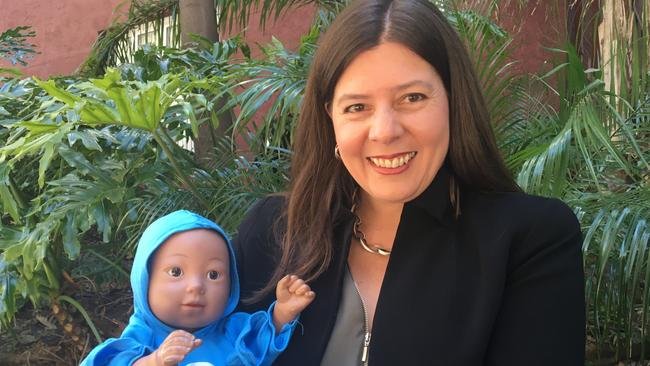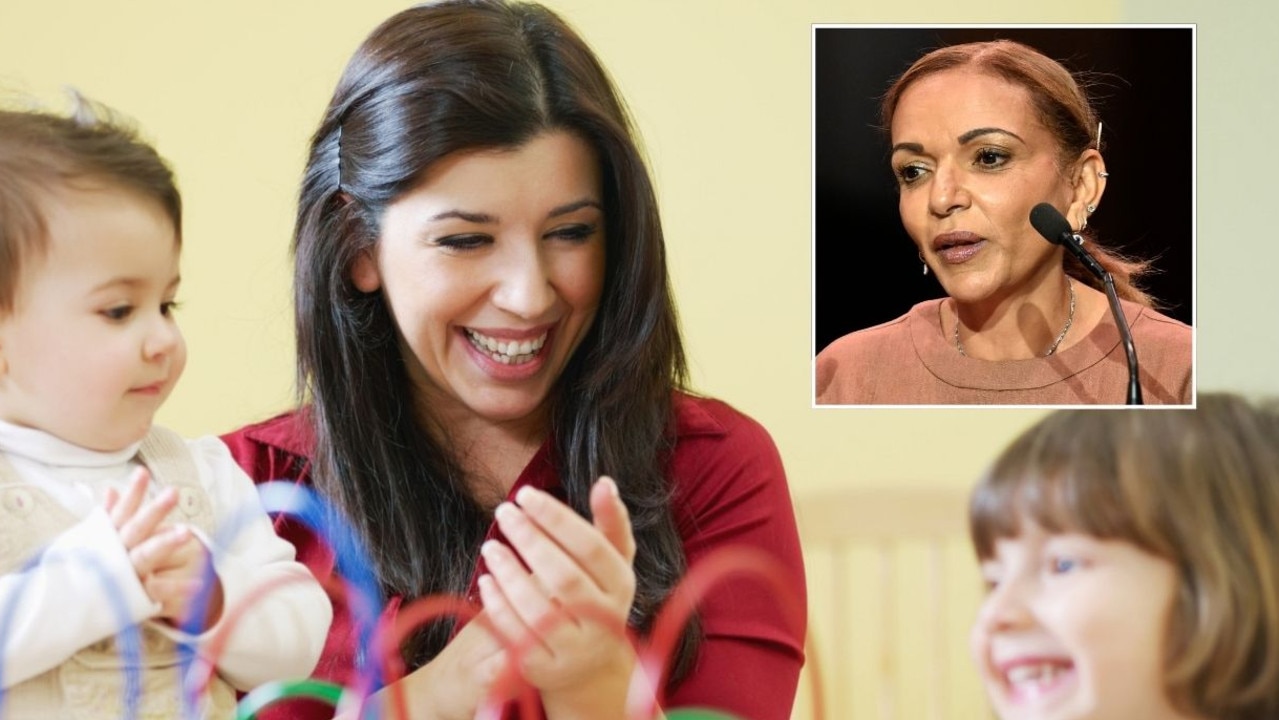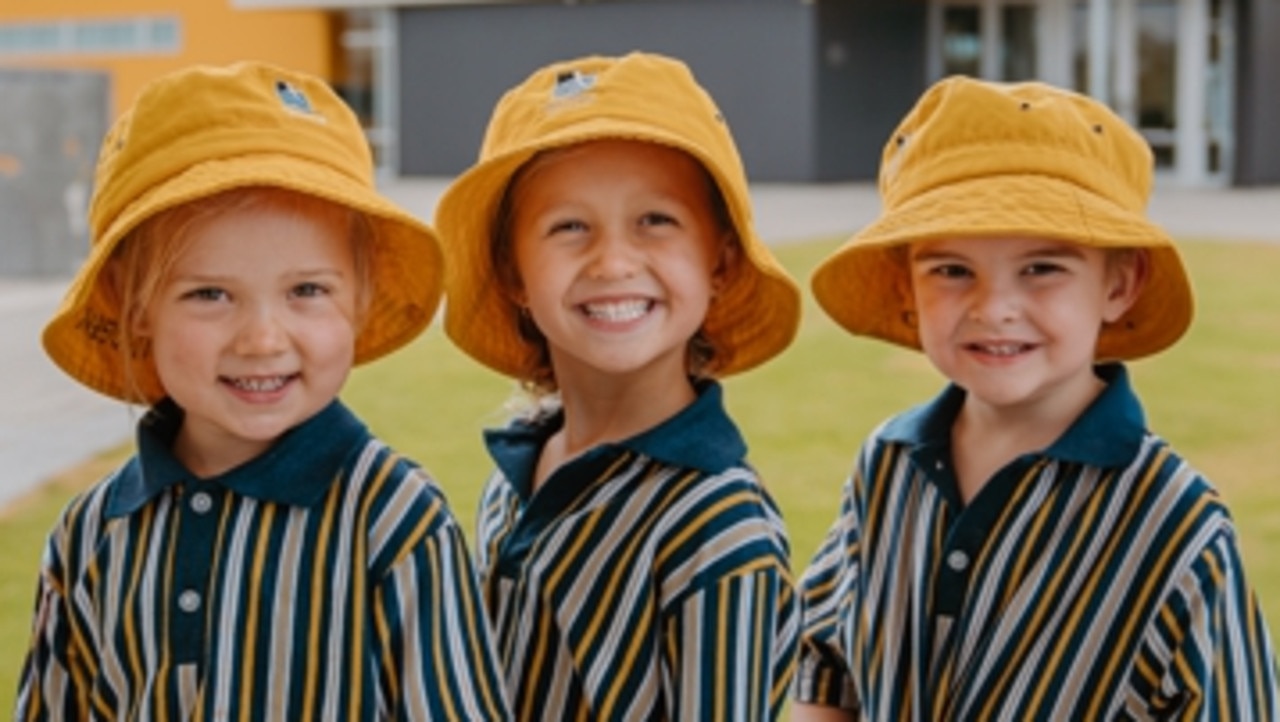Why early childhood development is vital to the future of our children
They are crucial milestones that could alter Australia’s future: the first 1000 days of a child’s life and a gap of 30 million words by the time children turn three. This is why.
Early Education
Don't miss out on the headlines from Early Education. Followed categories will be added to My News.
They are the two numbers that could alter Australia’s future: the first 1000 days of a child’s brain and a gap of 30 million words by the time children turn three.
Between them, they are driving a seismic shift towards the creation of a free, national preschool system for Australian infants and toddlers.
Various experts have appeared before a royal commission into early education being conducted by former Labor prime minister Julia Gillard in Adelaide.
The former federal education minister has been charged with determining the best way to put three-year-old children into South Australian government preschools and kindergartens.
Ms Gillard has heard how the first 1000 days of a child’s life are crucial to the development of the human brain.

Researchers have described how long-term damage can be done to a child if they are exposed to trauma as infants, severely affecting their ability to learn and cope with adversity.
They also have told Ms Gillard that new research has confirmed the results of a study conducted in the 1990s which found there was a 30 million gap in the vocabulary of children from socially disadvantaged parents compared to those from wealthy, educated parents.
During public hearings earlier this month, University of Melbourne researcher Associate Professor Brigid Jordan told Ms Gillard the human brain did not start functioning independently until a baby was born.
“The brain is undeveloped at birth and has to do a lot of growing,” she said.
“During the first weeks of life you learn about emotional regulation and how to react to adverse experiences.”
Associate Professor Jordan said a study she was conducting showed hostility, violence or trauma near infants caused them to “use all their bandwidth to concentrate on trying to feel safe and secure”.
“They don’t have the brain power to deal with what the world has to offer us,” she said.
“They learn less, they might shut down, they might withdraw.”

Centre for Community Child Health director Professor Sharon Goldfield said research had shown there were particular parts of the infant brain which were susceptible to adversity.
“One of those areas is the area responsible for self-regulation,” she said. “And what that really means is the ability for a child to sort of regulate themselves, you know, sit on a mat, listen.
“And that leads to the sorts of things about them being able to take in information and do something with it if you like.
“The other area is oral language, which is quite sensitive to disadvantage and that’s children’s ability to develop their vocabulary, their communication skills. And of course, that’s the scaffolding for literacy and reading.
Professor Goldfield said the role early childhood education played in ensuring the brain developed properly was invaluable.
“What’s really interesting is those are the two areas that I think early child education and care, particularly preschool, can be so strong because it’s really about starting to put in that sort of structured environment for children,” she said
“We want our children to grow healthy brains, especially for those children who are living in some disadvantaged position.”
Early childhood researcher and SA Child Development Council chairwoman Victoria Whitington said this was why getting children into preschool as soon as possible was so important, especially those who had developed “a survival brain” to protect themselves.
“In these early years, we are setting up the architecture of the brain for young children which will provide a firm or shaky basis on which to develop their lives in terms of their health, both mental and physical, their capacity to learn,” she said.
“And also the behavioural element, which is about whether they can manage themselves with other people and co-operate and get on and work and do all those things that we need to do as members of our community.”

University of South Australia researcher Professor Sally Brinkman said it was important to expose infants and toddlers to early education as soon as possible to expose them to other vocabularies apart from their parents.
Professor Brinkman is part of a team recording conversations between parents of infants and toddlers in South Australia with mothers who only finished high school compared to mothers with degrees.
The study is similar to a groundbreaking report by two American researchers, Betty Hart and Todd Risley, who went to 42 homes of poor, socially disadvantaged families, middle income and high income families.
In 1995, they found there was a gap of 30 million words in the vocabularies of the children from the various socio-economic backgrounds they studied.
Professor Brinkman said preliminary findings from her research showed there was a dramatic escalation in the language of toddlers from 12 to 18 months.
She told Ms Gillard this was the ideal time to provide quality early education to ensure toddlers developed good vocabularies.
“We started to see their language vocalisation escalate, especially with the children from mothers with one degree,” she said.
“It seems the time to really support and encourage parents to engage with their children is when they first start talking at 12 to 18 months but what is there in that space?
“There is a large gap with a lack of services. It comes down to what can we do from an interventional point of view and how can we become engaged during these important developmental milestones.”

Another staunch advocate for getting children into early childhood education as soon as they start talking, if not earlier, is Thrive By Five chief executive Jay Weatherill.
A former South Australian Labor premier, his organisation — funded by billionaire West Australian miner Twiggy Forrest – has been lobbying for an universal preschool system since he left politics in 2018.
“What profoundly affects children in the first five years is the environment around them,” he said.
“It is the time when the wiring of the brain is being laid down through a million new neural connections every second.
“A time when brain development is so accelerated, so concentrated, that by the time a child reaches the age of five their brain has already reached 90 per cent of its adult size.
“Most people know about early child development but once they hear the brain story they go from thinking it is huge to knowing it is vital.”
As part of his campaign, Mr Weatherill this month organised an open letter to the federal government signed by 53 early child development organisations, researchers and advocates.
Published just days before a national summit on the early years was held in Canberra, it called for legislation to create an universal early childhood system.
Mr Weatherill said there was overwhelming evidence showing any form of early childhood education was beneficial.
“Every single child, no matter where they live or how much money their parents earn, should have access to proper infant and maternal health care, comprehensive family support, at least two years of preschool and universally accessible, high-quality education and care,” he said.
Mr Weatherill said investing in universal childhood development “is the tide that lifts all boats”.
“It fundamentally helps build the capacity of individuals, our communities and our society,” he said.
Mr Weatherill said should be “no acceptable roadblocks to children and families accessing the services that support their healthy development”.
“Our services cannot stop at the edge of the city, at a certain price point, or become difficult just because of who you are and where you are from,” he said.
Oxford University professor and internationally-renowned child development researcher Iram Siraj also believes free preschool must be provided, especially for socially disadvantaged children.
Professor Siraj, who has provided expert advice to state governments including South Australia and Queensland, said it was indisputable that early education positively impacted on social and cognitive development.
Research conducted in countries which had introduced free early childhood education such as the United Kingdom and Norway showed children performed better at primary and secondary school than those who did not go to childcare or early learning centres.
“Overall, while high quality education is really important, even lower quality offers something compared to staying at home because preschool offers something which is different,” she said.
“(This is because) children get different experiences than staying at home, including social interaction. It is good for a three-year-old to meet another three-year-old and a four-year-old to meet another four year old.”

Professor Siraj said early childhood education was the best opportunity to address inequality between children from disadvantaged families and those from wealthier, more stable backgrounds.
“Inequality for children starts at birth because children don’t have a choice who they are born to, their gender or the economic and educational circumstances of their parents,” she said.
“It means you are born into inequality when you leave the maternity ward.
“Early childhood education is the first chance children get at levelling or getting educational and social equality.”
Ms Gillard said the growing body of research, particularly about the growth of the human brain, proved why early childhood education was so important.
“Month by month, year by year, at an ever-increasing pace, researchers are discovering more about how children develop and the way the early years shape their future capacities, personalities and wellbeing,” she said.
“While there is still so much more to discover, increasingly we have the keys in hand to unlock the best possible future for every child.
“As a result, there is renewed momentum around Australia and the world to renew and redefine the vision for quality, early education as a foundation for all children.”

OASIS IN THE EDUCATIONAL DESERT
In the middle of a light industrial area, surrounded by warehouses and regentrified houses, is a 80-year-old early learning centre widely regarded as a national role model.
Described by staff as “an oasis in a desert”, Adelaide’s Lady Gowrie Child Centre is a cluster of buildings full of toys, books, paintings and musical instruments surrounded by a huge garden with towering trees, swings, sandpits, books and more toys.
Together with other centres in Sydney, Melbourne, Brisbane, Perth and Hobart, it was established in the 1940s by Lady Zara Gowrie, the wife of then governor-general Sir Alexander Hore-Ruthven, to provide early education to our capital cities’ poorest families.
Over the past eight decades, the centres have become trailblazers in ensuring infants and toddlers receive the best care and attention from highly-qualified early childhood educators.
Lady Gowrie’s Adelaide chief executive Lynne Rutherford said the centres operated on the basis that children had rights.
“Our children have the right to choose what they do and when they do it,” she said.
“We work with children to build their capacity and capabilities.”

Ms Rutherford said how long children spent their time with their primary caregivers was a key difference to other facilities.
“We did two years of research and ended up integrating infants with toddlers, so we now have six months to three years, three years to school age,” she said.
Ms Rutherford said not only did children develop stronger bonds with individual staff, they also spent more time with other children of different ages in their groups.
“It also helps build relationships with parents, who we always spend time when they first come to the centre getting to know,” she said.
“Some don’t like their children eating outdoors, others don’t like water in sandpits.
“We want to build relationships with our parents, we want them to feel comfortable.”
Ms Rutherford said another key feature was a requirement for all staff have a minimum qualification of a diploma in teaching.
“We provide ongoing learning for staff, they’re encouraged to keep learning, encouraged to keep studying,” she said.
“We also provide training to other early education providers.”
Lady Gowrie SA chairwoman Associate Professor Victoria Whitington said the philosophy behind the centres had not changed since the 1940s.
“What we do is create environments for children in the early years where they are safe, their needs are met and their parents are supported,” she said.





